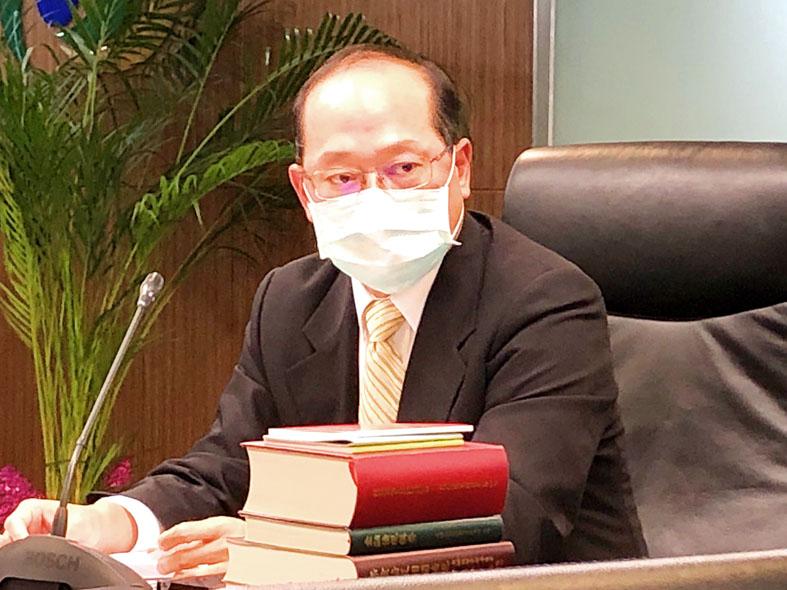The Financial Supervisory Commission is to set up new money laundering regulations for the nation’s cryptocurrency exchanges from July 1, requiring them to report transactions valued at more than NT$500,000 (US$17,770), the commission said yesterday.
The move came after the Executive Yuan earlier this month demanded that the commission establish regulations to prevent money laundering in the cryptocurrency industry.
The cryptocurrency industry includes local trading platforms for cryptocurrencies, cryptocurrency wallet providers and firms that conduct security token offerings, the Executive Yuan said.

Photo: Kelson Wang, Taipei Times
The commission plans to require cryptocurrency exchanges to report any transaction of more than NT$500,000 conducted in cash, or an equivalent amount denominated in a foreign currency, Banking Bureau Deputy Director-General Lin Chih-chi (林志吉) told a news conference in New Taipei City.
That is in line with the commission’s money laundering requirements for conventional banks, Lin said.
However, investors are unlikely to buy bitcoin with more than NT$500,000 in cash, as most exchanges require clients to link their bank accounts to their trading services, a commission official surnamed Yen (顏) said.
The BitoPro (幣託) exchange does allow clients to pay with cash at local convenience stores, but the amounts are limited to NT$20,000 at a single store, the official said.
For trades between different types of cryptocurrency — such as investors exchanging ether for bitcoin — the commission is to require exchanges to report large transactions and to ensure they fulfill the “know your customer” requirements, Lin said.
The commission is to hold a public hearing next month with eight local exchanges, including Maicoin Ltd (現代財富科技), Ace Digital Innovations Co Ltd (王牌數位創新) and BitoPro, he said.
While some exchanges have reportedly required their clients to reopen their accounts to fulfill the “know your customer” requirements, the commission had not issued such an order, Lin said.
The commission’s regulation of the industry is to focus on customer identity authentication and “know your customer” requirements, personal data storage and information security, Lin added.
Companies that fail to comply with the new regulations would face fines of up to NT$10 million, the commission said.

In Italy’s storied gold-making hubs, jewelers are reworking their designs to trim gold content as they race to blunt the effect of record prices and appeal to shoppers watching their budgets. Gold prices hit a record high on Thursday, surging near US$5,600 an ounce, more than double a year ago as geopolitical concerns and jitters over trade pushed investors toward the safe-haven asset. The rally is putting undue pressure on small artisans as they face mounting demands from customers, including international brands, to produce cheaper items, from signature pieces to wedding rings, according to interviews with four independent jewelers in Italy’s main

Japanese Prime Minister Sanae Takaichi has talked up the benefits of a weaker yen in a campaign speech, adopting a tone at odds with her finance ministry, which has refused to rule out any options to counter excessive foreign exchange volatility. Takaichi later softened her stance, saying she did not have a preference for the yen’s direction. “People say the weak yen is bad right now, but for export industries, it’s a major opportunity,” Takaichi said on Saturday at a rally for Liberal Democratic Party candidate Daishiro Yamagiwa in Kanagawa Prefecture ahead of a snap election on Sunday. “Whether it’s selling food or

CONCERNS: Tech companies investing in AI businesses that purchase their products have raised questions among investors that they are artificially propping up demand Nvidia Corp chief executive officer Jensen Huang (黃仁勳) on Saturday said that the company would be participating in OpenAI’s latest funding round, describing it as potentially “the largest investment we’ve ever made.” “We will invest a great deal of money,” Huang told reporters while visiting Taipei. “I believe in OpenAI. The work that they do is incredible. They’re one of the most consequential companies of our time.” Huang did not say exactly how much Nvidia might contribute, but described the investment as “huge.” “Let Sam announce how much he’s going to raise — it’s for him to decide,” Huang said, referring to OpenAI

The global server market is expected to grow 12.8 percent annually this year, with artificial intelligence (AI) servers projected to account for 16.5 percent, driven by continued investment in AI infrastructure by major cloud service providers (CSPs), market researcher TrendForce Corp (集邦科技) said yesterday. Global AI server shipments this year are expected to increase 28 percent year-on-year to more than 2.7 million units, driven by sustained demand from CSPs and government sovereign cloud projects, TrendForce analyst Frank Kung (龔明德) told the Taipei Times. Demand for GPU-based AI servers, including Nvidia Corp’s GB and Vera Rubin rack systems, is expected to remain high,